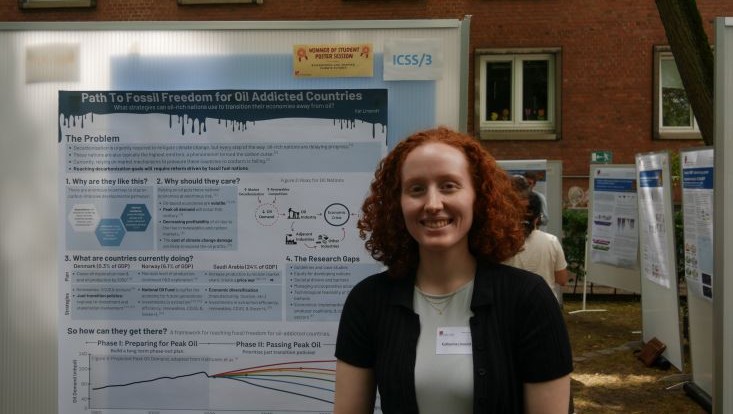CLIMATE AND EARTH
SYSTEM SCIENCES
Photo: UHH/Denstorf
24 November 2025

Photo: UHH
To mitigate climate change, we urgently need to move away from oil and gas. Yet some states show little interest in doing so – on the contrary, they even try to delay the global phase-out of fossil fuels. These oil addicted countries fear the transition, as their economies are heavily dependent on oil – in Saudi Arabia, for example, the oil sector accounts for about a quarter of GDP.
WHAT STRATEGIES CAN OIL-RICH NATIONS USE TO TRANSITION THEIR ECONOMIES AWAY FROM OIL?
This was the question ICSS student Kat Linscott explored in her poster for the course Researching and Shaping Climate Futures – with a very personal motivation: “I was inspired by the discussions on the future of oil that were taking place in Canada, my home country. I found it difficult to picture a world where it's feasible for a country like mine to stop producing and using fossil fuels without significant welfare loss.”
The situation is more complex than it may first appear. Oil-rich nations risk a hard crash: as demand declines, revenues collapse, jobs disappear, and political instability grows.
Kat developed a framework to open a path towards a fossil-free future. The goal is to reach Peak Oil – the moment when global demand for oil begins to decline permanently. In Phase I, the transition is prepared: no new exploration projects, greater efficiency, diverting revenues into sovereign wealth funds, and investing in renewables. Phase II marks the actual exit: ending subsidies, decarbonizing the economy, and retraining workers for new industries. New opportunities could emerge in markets such as hydrogen, biofuels, or CO₂ storage.
“Finding ways to equitably transition these nations’ economies off of fossil fuels could turn them from the biggest proponents of delay to drivers of decarbonization,” says Kat. Her conclusion: “Plan long-term. Start today. Just transition.”